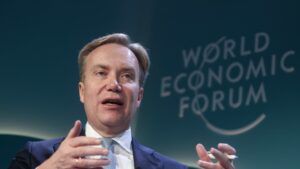In a recent speech at the World Economic Forum’s “Special Meeting on Global Collaboration, Growth and Energy for Development” in Saudi Arabia, Borge Brende, the president of the World Economic Forum, issued a sobering forecast for the global economy. He expressed concerns about the possibility of a decade of low growth if the necessary economic measures are not implemented.
Brende highlighted the fact that global debt ratios are approaching levels not seen since the 1820s, raising the specter of “stagflation” risk for advanced economies. He pointed out that the current global growth estimate stands at around 3.2%, which is lower than the trend growth rate of 4% that the world has been accustomed to for decades.
One key takeaway from Brende’s remarks is the importance of avoiding a trade war in order to sustain global growth. He emphasized the need for countries to continue trading with one another, albeit in a changing landscape where global value chains may undergo some restructuring.
Another critical issue Brende addressed is the escalating global debt situation, with debt levels nearing 100% of the global GDP. He stressed the importance of governments taking the necessary fiscal measures to reduce debt without risking a recession.
Furthermore, Brende highlighted the potential of generative artificial intelligence as an opportunity for the developing world. He also underscored the need for governments to address persistent inflationary pressures.
Brende’s warning aligns with a recent report from the International Monetary Fund (IMF), which revealed that global public debt had risen to 93% of GDP last year and could approach 100% of GDP by the end of the decade. The IMF also pointed out the high debt levels in China and the United States, noting that loose fiscal policies in the U.S. could exert pressure on rates and the dollar, potentially raising funding costs globally.
Despite the challenges, the IMF slightly raised its global growth forecast, citing the resilience of the world economy in the face of inflationary pressures and monetary policy shifts. The IMF now expects global growth to reach 3.2% in 2024.
In conclusion, Brende highlighted the geopolitical risks facing the global economy, particularly referencing tensions between Iran and Israel. He warned that such conflicts could lead to a spike in oil prices, causing significant harm to the global economy.
At the Extreme Investor Network, we strive to provide you with unique insights and analysis on the latest developments in the economy and global markets. Stay informed with our expert commentary and stay ahead of the curve with our in-depth research and investment strategies.


